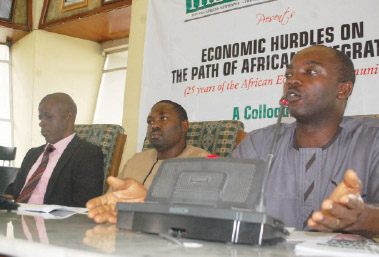The Difference newspaper lived up to its name when, penultimate Wednesday, it was perhaps the only media organisation that marked the Africa Day at the Nigerian Institute of International Affairs (NIIA).
The pan-African newspaper published from Lagos by Sunbird Africa Media Limited held a colloquium to celebrate the anniversary of the formation of the Organisation of African Union (OAU), now the African Union (AU), which is 53 years old this year. The ceremony takes place on May 25.
With the theme, ‘Economic hurdles on the path of African Integration (Examining 25 years of the Abuja Treaty and the African Economic Community)’, the event brought together personalities from the academia, business and media to discuss the challenges facing the formation of an appropriate economic community for African states and to chart a way forward for the continuing integration and economic transformation of the continent.
Joshua Bolarinwa and Sharkdam Wapmuk, both of NIIA, led the discussions on the issues impeding the realisation of the goal of complete integration and total economic transformation of Africa.
Attention was drawn to efforts over the years by some African leaders to create a fitting environment for development through enabling the creation of economic communities to transform the economies of these countries. At the national level for example, the late Kwame Nkrumah had a dream to make Ghana a paradise 10 years after independence, but this and other lofty dreams by other African leaders met road blocks, which include their mismatched ties to the former colonial lords and the world economic system. These have continued to interfere with, if not frustrate, Africans’ ambitions of growing the continent by themselves.
African people and their leaders, according to the scholars, have done the right thing in their efforts towards drawing up a fitting framework for an African Economic Community (AEC) over the years that would first involve the strengthening of regional economic commissions. They however noted that much more needs to be done by stake-holding countries if the lofty objective is to be realised.
It was equally observed that almost all of these initiatives, including the Lagos Plan of Action of 1980 which led to the Abuja Treaty of 1991 and the AEC, and the New Partnership for African Development (NEPAD) have failed from the point of view of stated success factors and end dates in terms of achieving several of the milestones.
The scholars did not shy away from dissecting the different issues bedevilling the African economic integration story. One significant solution proffered was that African leaders should not be allowed to continue paying lip service to issues of economic integration. Rather, they should be pressured into being more committed to African integration and development and not carrying on with the vain illusion that help in resolving the continent’s many problems would continue to come from other places.
Other impediments that were identified include the fact of some African nations not wanting to cooperate fully with others and the inability of state leaders to fully back and support the strengthening of such supranational entities as the Pan-African Parliament, as some of them think that the empowerment and growth of such organs would primarily undermine their own sovereign control over their national jurisdictions.
There are also problems of intra- and inter-regional coordination, inadequate finance, linguistic plurality and the lack of capacity to practically implement agreed objectives.
Internal political crisis and other forms of conflicts such as the Boko Haram insurgency and bombing of pipelines by militants in Nigeria as well as cross-border crimes are also some of the impeding factors.
African countries also battle health challenges on a large scale such as Ebola and HIV/AIDS, even as the traditional support from international donor agencies are drying up.
At the end of deliberations, the colloquium decried the neglect by Nigerian governments of the celebration of Africa Day, being the anniversary of the creation of the OAU which is not marked in any significant way in Nigeria.
On its part, The Difference Newspaper pledged to continue to nudge the conscience of the government and people of Nigeria to give Africa Day the deserved attention to make it a calendar event in Nigeria.
African leaders were finally enjoined to stop paying lip service to the treaties they sign on behalf of their people.
Accordingly also, efforts should be made to review, and not discard, existing treaties that are yet in force with a view to setting up more realistic timelines for their actualisation.

- Advertisement -
- Advertisement -
Must Read
BBNaija’s Sheggz says It’s wrong to split bills equally with a...
Sheggz, who is in a relationship with another BBNaija star, Bella, said she contributes about 20 percent, while he handles the remaining










